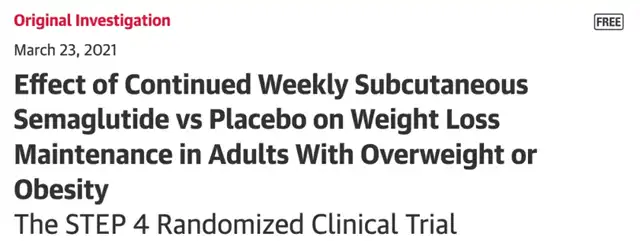“Miracle Weight-loss Drug” Semaglutide Is Not Always Effective
- Normal Liver Cells Found to Promote Cancer Metastasis to the Liver
- Nearly 80% Complete Remission: Breakthrough in ADC Anti-Tumor Treatment
- Vaccination Against Common Diseases May Prevent Dementia!
- New Alzheimer’s Disease (AD) Diagnosis and Staging Criteria
- Breakthrough in Alzheimer’s Disease: New Nasal Spray Halts Cognitive Decline by Targeting Toxic Protein
- Can the Tap Water at the Paris Olympics be Drunk Directly?
“Miracle Weight-loss Drug” Semaglutide Is Not Always Effective: What Happens When You Stop Taking It?
- Should China be held legally responsible for the US’s $18 trillion COVID losses?
- CT Radiation Exposure Linked to Blood Cancer in Children and Adolescents
- FDA has mandated a top-level black box warning for all marketed CAR-T therapies
- Can people with high blood pressure eat peanuts?
- What is the difference between dopamine and dobutamine?
- How long can the patient live after heart stent surgery?
“Miracle Weight-loss Drug” Semaglutide Is Not Always Effective: What Happens When You Stop Taking It?
On February 29, 2024, the World Health Organization (WHO) released the latest survey data in the top international medical journal The Lancet, showing that the global total number of obese people has exceeded 1 billion. This means that 1 in every 8 people is obese. More importantly, the obesity rate among children and adolescents is rapidly increasing, with the obesity rate among children and adolescents in 2022 being 4 times that of 1990.
Corresponding to the huge number of obese people and the rapidly increasing obesity rate, GLP-1 receptor agonists such as semaglutide have become the most popular drugs in the world. In 2023, Novo Nordisk’s semaglutide sales exceeded $20 billion.
The emergence of GLP-1 receptor agonists such as semaglutide has completely changed the weight-loss market, allowing people to achieve weight loss results close to that of weight-loss surgery simply by taking medication. However, while semaglutide is selling well, many people are giving up on continuing to use it after a period of time.
A recent survey report published by researchers at the Cleveland Clinic in the journal Obesity showed that among obese patients prescribed weight-loss drugs (semaglutide, liraglutide, phentermine-topiramate, naltrexone-bupropion, orlistat), 44% were still using the drugs after three months, 33% were still using them after six months, and only 19% were still using them after one year. Among obese patients using semaglutide, the proportions still using the drug after three months, six months, and one year were 63%, 56%, and 40%, respectively. In other words, less than half of the people who could persist in using semaglutide for a year.

Continued use of semaglutide can make people feel fuller faster and for longer, thus achieving effective weight loss. So why are these obese patients unable to persist in using it?
Researchers and clinicians typically consider GLP-1 receptor agonists as a lifelong treatment, but in reality, there are many factors that force patients to stop using them. For example, it may be difficult to continue to afford the price, suffer from severe side effects, experience drug shortages, or have limited prescription periods.
With the continuous increase in the number of obese people, the obesity rate, and the continuous hot sales of GLP-1 receptor agonists such as semaglutide, researchers have begun to try to answer a key question—what happens when people stop taking these weight-loss drugs?
What happens to weight and health after stopping the drug?
Semaglutide has been used for many years to treat type 2 diabetes (under the trade name Ozempic), and since 2021, it has been approved for the treatment of obesity (under the trade name Wegovy). Semaglutide is a glucagon-like peptide-1 (GLP-1) receptor agonist that mimics its actions, reduces hunger, decreases food intake, and reduces calorie intake, with remarkable effects on lowering blood sugar and losing weight.
In addition, semaglutide has been shown to significantly reduce the risk of cardiovascular disease in overweight and obese patients with or without diabetes. On March 9, 2024, the US FDA announced the approval of a new indication for semaglutide—used to reduce the risk of cardiovascular death, heart attack, and stroke in adults with cardiovascular disease and overweight or obesity.
Previous studies have explored what happens when people stop using GLP-1 receptor agonists. For example, a clinical study showed that after stopping GLP-1 receptor agonists for one year, many people regained about two-thirds of the weight they had lost.
Researchers believe that our bodies naturally tend to maintain our weight, which can be likened to a taut rubber band. When you use a GLP-1 receptor agonist to lose weight, it’s like reducing the tension of the rubber band, and when you stop taking the drug, this tight tension returns, and the lost weight returns.
For example, a clinical trial published in JAMA in 2021 showed that about 800 participants were given semaglutide once a week, changed their dietary habits, exercised, and received professional counseling. In 20 weeks, their average weight decreased by 10.6%. Then, one-third of them were switched to a placebo for 48 weeks. The results showed that those who switched to the placebo regained 6.9% of their weight, while those who continued to use semaglutide continued to lose weight by 7.9%.
In other words, in the 68 weeks of using semaglutide and changing their lifestyle, the participants lost an average of 17.3% of their weight, while those who stopped taking the drug for nearly a year regained about two-thirds of the weight they had lost.

In a observational study published in January of this year, among 2,074 patients using semaglutide, after stopping the drug for 1 year, 18% of them regained 100% of the weight they had previously lost, or even became fatter; 26% of them regained 25%-99% of the weight they had previously lost; and the remaining 56% of them either maintained or continued to lose weight.
It is worth noting that weight regain after stopping the drug is not the only health risk factor. A clinical study published in JAMA in 2021 showed that participants who continued to use semaglutide saw their waistlines continue to shrink, while those who stopped taking the drug began to regain abdominal fat, which is located around vital organs and can lead to problems such as fatty liver disease. In addition, heart disease and insulin resistance are also related to excessive abdominal fat.
In fact, if those who use GLP-1 receptor agonists to lose weight can maintain healthy eating and exercise habits after stopping the drug, they can maintain their body shape and prevent weight regain. If they return to their previous eating habits or experience stress and other factors, the risk of weight regain is high.
What are the reasons for stopping the drug?
It may not be easy to continue using GLP-1 receptor agonists. Some people may experience side effects such as nausea, vomiting, diarrhea, and constipation. Multiple clinical trials have shown that nearly 75% of participants using semaglutide have experienced gastrointestinal discomfort, although most of these side effects are mild to moderate. About 7% of clinical trial participants withdrew from the trial due to gastrointestinal or other adverse events.
Novo Nordisk, the developer of semaglutide, has also encountered difficulties in drug supply. Since 2022, semaglutide has been in short supply, leading some people to stop taking it because they could not buy it in time.
In addition, when semaglutide is used for weight loss, it is usually not covered by insurance, so users need to pay for it themselves. For example, the price of semaglutide for weight loss in the United States is $1,350 per month, which is not cheap, making it difficult for some people to use it long-term.
Of course, many people stop taking the drug because they have successfully reached their target weight, or as time goes on, the weight loss effect plateaus, and their weight stabilizes, no longer continuing to decrease.
What is the best way to stop taking the drug?
When using GLP-1 receptor agonists, start with the lowest dose and gradually increase the dose over the next few months. This gradual dose escalation helps to reduce side effects. Although doctors believe that these drugs need to be used long-term to maintain the effect of weight loss, in reality, suddenly stopping the drug does not have any biological harm, and it will not cause withdrawal reactions like some drugs.
However, clinical studies have shown that some users feel stronger hunger after stopping the drug than before using it. Therefore, it is recommended to gradually reduce the dose instead of stopping the drug abruptly, which may help prevent a sudden rebound in hunger.
Researchers also suggest that those who decide to stop taking the drug should pay attention to changes in their appetite and weight. If they find that their weight is starting to rebound, they can start using a lower dose again, rather than waiting for all the lost weight to fully recover before taking action. In addition, it is recommended to maintain a healthy diet and exercise habits after stopping the drug, which can help prevent weight regain.
One of the most common reasons people stop using GLP-1 receptor agonists such as semaglutide is that their weight loss stagnates, leading them to believe that the drug is no longer effective. In fact, this is a plateau in weight loss, and if further weight loss is desired, it may be necessary to increase the dose (but increasing the dose may increase the risk of side effects).
In addition, many people stop dieting once they reach their target weight. In fact, obesity is a chronic disease that requires lifelong maintenance, including drug treatment, just like hypertension or heart disease, and there is currently no cure for obesity.
In recent years, various new GLP-1 receptor agonists have been developed, and these drugs have been expanded to various different indications, including cardiovascular diseases, liver diseases, Alzheimer’s disease, Parkinson’s disease, cancer, and even AIDS. Now, we may need more research to explore what happens after successful weight loss using these drugs.
“Miracle Weight-loss Drug” Semaglutide Is Not Always Effective: What Happens When You Stop Taking It?
References:
1. https://www.thelancet.com/journals/lancet/article/PIIS0140-6736(23)02750-2/fulltext
2. https://onlinelibrary.wiley.com/doi/10.1002/oby.23952
3. https://jamanetwork.com/journals/jama/fullarticle/2777886
4. https://www.epicresearch.org/articles/many-patients-maintain-weight-loss-a-year-after-stopping-semaglutide-and-liraglutide
5. https://www.nature.com/articles/d41586-024-01091-8
(source:internet, reference only)
Disclaimer of medicaltrend.org
Important Note: The information provided is for informational purposes only and should not be considered as medical advice.



